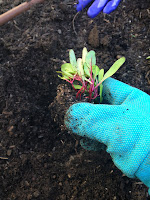Today I had the chance to attend an Earth Day Fair at Westminster College, a local university here in Salt Lake City. After several days of rain, the sun was shining and the flowers were blooming. Check out the beautiful pink flowering trees that sprinkle the campus. Not sure if they're cherry blossom or dogwood, but they were beautiful and very dreamlike!
My friend's husband is a student in the Environmental Sciences department, and part of a Real Food movement on campus called
Westminster for Real Food. College campuses, both public and private, offer an array of food options from catered to cafeterias to fast food chains to Greek housing to convenience stores, but how many offer healthy, sustainable options from local sources?
Enter the
Real Food Challenge: a nationwide movement to increase the pervasiveness of real food on college campuses. Real food is defined by the Real Food Challenge as "food which
truly nourishes producers, consumers, communities and the Earth. It is a food system--from seed to plate--that fundamentally respects human dignity and health, animal welfare, social justice and environmental sustainability." To me, the easiest way to define real food is that which comes from the Earth, free of artificial ingredients, preservatives, growth horomones, etc. Just fresh, clean food.
Check out this adorable little ambassador.
The goal of the Real Food Challenge is "to shift $1 billion of existing university food budgets away from industrial farms and junk food and towards local/community-based, fair, ecologically sound and humane food sources—what we call 'real food'—by 2020." According to the website there are currently 363 schools across the country participating. Is yours?
Another 'movement' at the fair that I thought was pretty rad, was a funky, brightly-colored old school bus called The Green Urban Lunch Box. When I stepped inside, this is what I saw:
Where seats once existed, there are now two large, wooden beds filled with dirt, seeds and tiny plants; a "mobile greenhouse" as founder Shawn Peterson referred to it. The mission of
The Green Urban Lunch Box is to educate on agriculture, sustainability, healthy eating, and bring the urban garden to schools in a creative way. As I mentioned in a previous post, urban gardening, whether makeshift on a tiny apartment balcony or a 4' x 10' plot in a community garden, is all the rage in progressive communities across the country.
They also have a program called
The Back-Farm Program which is targeted to senior citizens and folks with disabilities; volunteers build community gardens in the backyards of program participants' homes. The staff maintains and cultivates the garden in exchange for a share of the produce.
I love the creativity of Shawn's concept, and the fact that it targets children. With more and more people embracing real food, it's so important to encourage education in the next generation. And in a time where even children's day-to-day lives are riddled with technology, constant stimulation and instant gratification, here's a program that encourages us to slow down. Let's teach our children to slow down. How magical to see the wonder and amazement in a child's eyes as they slow down, plant a seed and watch it grow.
Now You Know, Now You Grow.

 First we prepared the soil by raking the Earth. We amended the soil from last season with rich, organic soil, and then dug in and planted our crops one by one. Spices included spearmint, basil, chives and rosemary. An array of veggies that will soon peak through the Earth in all of their colorful, vitamin-rich glory included red peppers, beets, brussel sprouts, red-leaf lettuce, tomatoes.
First we prepared the soil by raking the Earth. We amended the soil from last season with rich, organic soil, and then dug in and planted our crops one by one. Spices included spearmint, basil, chives and rosemary. An array of veggies that will soon peak through the Earth in all of their colorful, vitamin-rich glory included red peppers, beets, brussel sprouts, red-leaf lettuce, tomatoes. I have to say, I'm most excited for the brussel sprouts! I'm sure many of you scrunched your nose when I said that, but one of my favorite side dishes is roasted brussel sprouts...cleaned, sliced in half, drenched in olive oil, salt, pepper and garlic, and roasted in the oven at 350 degrees on a cookie sheet. They come out crunchy, golden and delicious!
I have to say, I'm most excited for the brussel sprouts! I'm sure many of you scrunched your nose when I said that, but one of my favorite side dishes is roasted brussel sprouts...cleaned, sliced in half, drenched in olive oil, salt, pepper and garlic, and roasted in the oven at 350 degrees on a cookie sheet. They come out crunchy, golden and delicious! 



